How Long Does It Take to Build an App
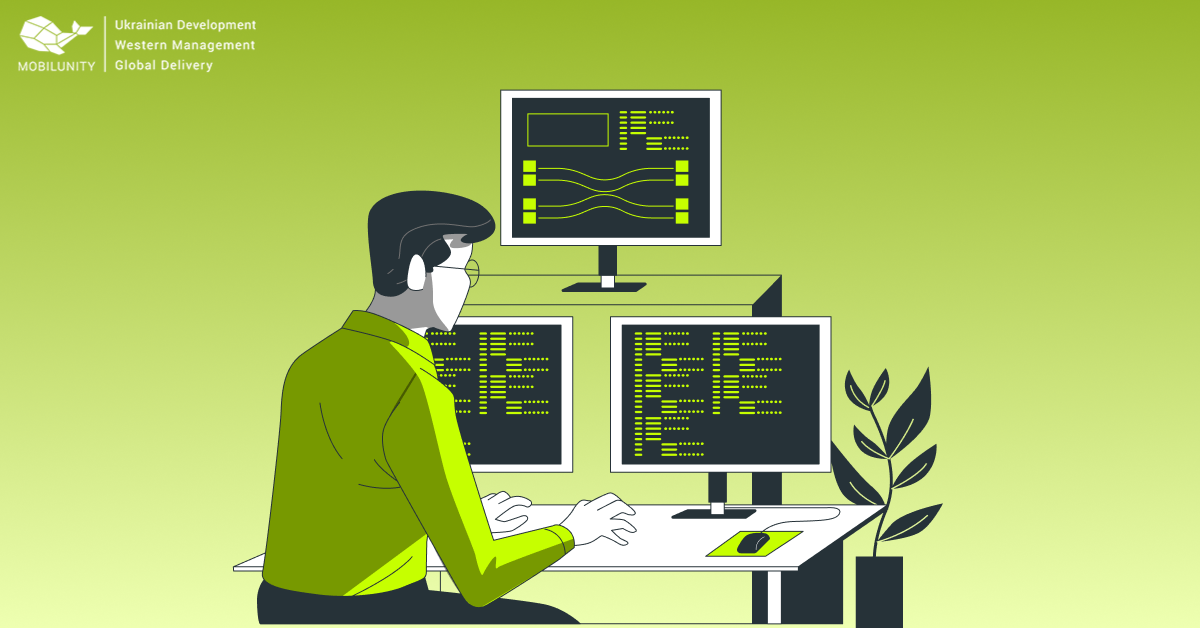
As technology continues to shape our daily lives, the demand for innovative apps is at an all-time high. Whether you’re dreaming of the next groundbreaking app, creating viral content, or connecting people worldwide, understanding the time and key processes it takes to bring these ideas to life is important.
Apps have changed the way we live. These days, you can do almost anything on an app. In fact, studies show that 88% of the time spent on mobile phones is spent on apps. For businesses that want to thrive, investing in an app is the way forward.
The app development field is a vast playground filled with opportunities. The total revenue expected for mobile apps is over $935 billion. From gaming to productivity, healthcare to entertainment, the scope is big, and the potential is truly limitless. Developers, today, are armed with cutting-edge tools, and the pace of innovation is faster than ever before.
If you’re interested in app development, it’s essential to have a pulse on the current trends and technologies. In this guide, we look at how long does it take to build an app that can match the caliber of industry giants, including:
- Airbnb
This app transformed the hospitality industry by allowing individuals to rent out their homes or spare rooms to travelers. Launched in 2008, it quickly became a global platform connecting hosts and guests.
- Uber
Uber disrupted traditional transportation with its user-friendly ride-sharing platform. Since its inception in 2009, Uber has been offering a convenient alternative to traditional taxis.
- TikTok
TikTok, born in 2016, took the social media world by storm with its short-form video format. The app allows users to create and share entertaining clips, fostering a global community of creators.
This app, founded in 2009, changed communication by providing a secure messaging platform. It allows users to send texts, make voice and video calls, and share media globally.
Factors That Impact the Development Timeline
Deciding to invest in a new app is exciting, but its success is really tied to various factors that can greatly influence the timeline. Understanding these elements fully is crucial for Android app developer experts and businesses alike, as they go through the process of app creation. Here are the factors to consider when thinking about how long does it take to develop an app:
- Factor 1: The Complexity of a New Idea
The complex nature of an app idea is a key factor that directly correlates with the question of how long does it take to make an app. Simple apps with basic functionalities may take a relatively short time to build, while complex applications involving intricate features, advanced algorithms, or integration with other systems demand a more extensive development period. Evaluating the intricacy of your app concept is essential to establish realistic timelines.
- Factor 2: Specific Requirements
Details in defining the app’s requirements is another important factor influencing the development timeline. Frequent changes in project specifications can lead to delays as Android or iOS app developer pros may need to rework certain aspects of the application. Thoroughly documenting and communicating exact goals from the beginning can really streamline the development process when thinking about how long does it take to develop an Android app.
- Factor 3: The Final Result’s Accuracy
Perfection can be both a benefit and a challenge in app development. Getting the right balance between delivering a high-quality product and sticking to the project timeline is important when considering how long does it take to make an iOS app. Thorough testing, feedback loops, and great quality assurance processes contribute to the accuracy of the final result.
- Factor 4: The Business Expertise
When you think about how long does it take to create an app, the development is not only a technical task; it really needs a deep understanding of the target audience, market dynamics, and overall business goals. The level of business expertise within the development team and its alignment with the app’s objectives can influence the efficiency of the process.
How to Reduce App Development Time
If you’re thinking about how long does it take to make an Android app or iOS application, one effective strategy to streamline app development and minimize time-to-market is adopting a hybrid approach, starting with the creation of a Minimum Viable Product (MVP). The concept of an MVP involves you to hire mobile app developer experts and developing a simplified version of the app with core features that address the needs of the target audience. By doing so, developers can quickly release a functional version that serves as a foundation for future improvements.
Additionally, focusing on a hybrid development approach allows for the simultaneous creation of versions for both iOS and Android platforms. This approach uses frameworks like React Native or Flutter, enabling you to hire React Native experts and iPhone app developer experts to write code once and deploy it on multiple platforms. By going for cross-platform development, businesses can cut down development time and resources in a big way.
Rather than going for perfection in the first release, the hybrid MVP strategy focuses on delivering a functional product quickly. This not only fastens the time-to-market but also allows mobile and web app developer pros to gather valuable user feedback. Once the app gains popularity, updates can be tailored based on user insights. This not only accelerates the average app development time but also enhances the overall user experience.
How Long Does It Take To Build an App Like Airbnb
Wondering how long does it take to build an app like Airbnb? Airbnb is an innovative platform that transformed the hospitality industry by connecting hosts and travelers. The app allows individuals to list their homes or spare rooms for short-term rentals, providing a unique and personalized lodging experience.
If you’re interested in how to make an app like Airbnb, the key features include:
- Listing Management: Allow hosts to create and manage property listings with details like photos, descriptions, and availability.
- Booking System: A robust booking system that enables users to search for accommodations, view availability, and make reservations.
- User Profiles: User accounts with profiles, reviews, and preferences for both hosts and guests.
- Payment Integration: Secure payment processing for transactions between hosts and guests.
Team Setup
If you’re interested in how to develop an app like Airbnb, you have to understand that it requires a diverse team with specific roles and skill sets:
- Developers: Responsible for coding and programming the app. An iOS or Android app developer should have expertise in mobile app development, backend development, and possibly experience with platforms like Airbnb.
- Designers: Designers focus on creating an intuitive and visually appealing user interface and experience. Skills in UI/UX design, graphic design, and knowledge of design tools are essential.
- Project Managers: Project managers oversee the entire development process, ensuring timelines are met, and the project stays within scope. Strong organizational and communication skills are crucial.
- Quality Assurance (QA) Specialists: QA specialists conduct thorough testing to identify and rectify any bugs or issues in the app. Attention to detail and analytical skills are key.
Development Stages
For Airbnb like app development, the following stages should be considered:
- Conceptualization: Define the app’s purpose, features, and target audience.
- Design: Create wireframes, mockups, and user flows to visualize the app’s structure and design.
- Development: Code the app’s frontend and backend, integrating features and ensuring functionality.
- Testing: Conduct thorough testing to identify and resolve any issues or bugs.
- Launch: Release the app to the market and monitor its performance.
Estimated Time Frame
| Development Stage | In-House Timeline (Airbnb-like App) | Offshore Timeline (Airbnb-like App) |
| Recruiting/Onboarding | 2-4 Months | 3-4 Weeks |
| – Job Posting & Screening | 3-6 Weeks | 1-2 Weeks |
| – Interviews & Assessments | 4-6 Weeks | 1-2 Weeks |
| – Finalizing & Onboarding | 4-6 Weeks | 1 Week |
| Conceptualization | 1-2 Months | 2-4 Weeks |
| Design Phase | 2-4 Months | 1-2 Months |
| Development Phase | 4-8 Months | 3-5 Months |
| Testing & QA | 2-3 Months | 1-2 Months |
| Deployment | 1-2 Months | 3-6 Weeks |
| Post-Launch Adjustments | 2-3 Months | 1-2 Months |
| Total | Approx. 14-24 Months | Approx. 10-16 Months |
- In-House Development
Thinking about how to build an app like Airbnb in-house entails a comprehensive and lengthy process. The recruiting stage to hire app developer experts alone spans 2 to 4 months, involving job posting and screening for 3 to 6 weeks, interviews and assessments for 4 to 6 weeks, and finalizing and onboarding for an additional 4 to 6 weeks. This extended mobile app development timeline is primarily due to the intricacies of hiring skilled personnel and integrating them into the company culture. The conceptualization phase takes an additional 1 to 2 months, followed by a design phase lasting 2 to 4 months. The subsequent development phase is the most time-consuming, spanning 4 to 8 months, as it involves coding and building the entire application. In total, the in-house development of an Airbnb-like app can take an estimated 14 to 24 months.
- Offshore Team
On the other hand, thinking about how to create an app like Airbnb with an offshore team significantly streamlines the timeline. The recruiting and onboarding process is considerably faster, requiring only 3 to 4 weeks. Job posting and screening take 1 to 2 weeks, interviews and assessments are completed within 1 to 2 weeks, and finalizing and onboarding are achieved in just 1 week. The conceptualization phase is reduced to 2 to 4 weeks, and the design phase is expedited to 1 to 2 months. The development phase, while still substantial, is shorter at 3 to 5 months. The offshore development approach significantly shortens the overall timeline, with an estimated completion time of 10 to 16 months.
Estimated Cost
| Airbnb-like App | ||
| Role | Expected Monthly Involvement, hours | Cost Per Hour (USD) |
| Project Manager | 160-180 | $68 |
| UX/UI Designer | 120-140 | $47 |
| Front-end Developer | 160-180 | $57 |
| Back-end Developer | 160-180 | $52 |
| Mobile App Developer | 60-180 | $50 |
| QA Engineer | 100-120 | $45 |
| DevOps Engineer | 100-120 | $60 |
| Average Total Team Cost | $53,750 | |
How Long Does It Take To Build an App Like Uber
Interested in how long does it take to build an app like Uber? Uber has revolutionized the transportation industry with its seamless app, connecting riders with drivers for convenient and reliable travel.
If you’re wondering how to invest in Uber like app development and the details around Uber like app development cost, understanding its core functionality is crucial. The key features to consider when thinking about what does it take to make an app like Uber include:
Core Functionality
- GPS Integration: Real-time location tracking for both riders and drivers.
- Fare Calculator: Dynamic pricing based on distance, time, and demand.
- Driver/Rider Profiles: User accounts with personal information, trip history, and ratings.
- Rating System: Feedback and rating system for both riders and drivers.
Team Setup
App development like Uber requires a skilled and diversified team:
- Developers: An Android or iOS app developer must be proficient in mobile app development and backend systems for real-time operations.
- Designers: Specializing in UI/UX design for an intuitive user experience.
- Project Managers: Overseeing the development process, ensuring timelines are met.
- Quality Assurance (QA) Specialists: Conducting thorough testing to maintain app quality.
Development Stages
For Uber-like app development, follow these stages:
- Conceptualization: Define the app’s purpose, features, and target audience.
- Design: Create wireframes, mockups, and user flows for the app’s structure and aesthetics.
- Development: Code the frontend and backend, integrating key features for real-time functionality.
- Testing: Conduct rigorous testing to identify and resolve any bugs or issues.
- Deployment: Release the app to the market and monitor its performance.
Estimated Time Frame
| Development Stage | In-House Timeline (Uber-like App) | Offshore Timeline (Uber-like App) |
| Recruiting/Onboarding | 2-4 Months | 3-4 Weeks |
| – Job Posting & Screening | 3-6 Weeks | 1-2 Weeks |
| – Interviews & Assessments | 4-6 Weeks | 1-2 Weeks |
| – Finalizing & Onboarding | 4-6 Weeks | 1 Week |
| Conceptualization | 1-2 Months | 2-4 Weeks |
| Design Phase | 2-4 Months | 1-2 Months |
| Development Phase | 5-9 Months | 4-6 Months |
| Testing & QA | 2-3 Months | 1-2 Months |
| Deployment | 1-2 Months | 3-6 Weeks |
| Post-Launch Adjustments | 2-3 Months | 1-2 Months |
| Total | Approx. 15-27 Months | Approx. 11-17 Months |
- In-House Development
For Uber like taxi app development in-house involves a detailed and time-consuming process. The recruiting and onboarding stage spans 2 to 4 months, with job posting and screening taking 3 to 6 weeks, interviews and assessments lasting 4 to 6 weeks, and finalizing and onboarding requiring an additional 4 to 6 weeks. The conceptualization phase adds another 1 to 2 months, followed by a design phase lasting 2 to 4 months. The subsequent development phase, the most time-consuming, spans 5 to 9 months. In total, in-house Uber like clone app development can take an estimated 15 to 27 months.
- Offshore Team
Opting for an offshore team can streamline the timeline. So, how long does app development take? The recruiting and onboarding process is completed in 3 to 4 weeks. Job posting and screening take 1 to 2 weeks, interviews and assessments require 1 to 2 weeks, and finalizing and onboarding are achieved in just 1 week. The conceptualization phase is reduced to 2 to 4 weeks, and the design phase is expedited to 1 to 2 months. The development phase, while still substantial, is shorter at 4 to 6 months. The offshore development approach significantly shortens the overall app development time, with an estimated completion of 11 to 17 months.
Estimated Cost
Uber-like app development cost involves the following:
| Uber-like App | ||
| Role | Expected Monthly Involvement, hours | Cost Per Hour (USD) |
| Project Manager | 160-180 | $68 |
| UX/UI Designer | 120-140 | $47 |
| Front-end Developer | 160-180 | $57 |
| Back-end Developer | 160-180 | $52 |
| Mobile App Developer | 60-180 | $50 |
| QA Engineer | 100-120 | $45 |
| GIS Specialist | 100-120 | $36 |
| DevOps Engineer | 100-120 | $60 |
| Payment SystemIntegration Specialist | 80-100 | $62 |
| Average Total Team Cost | $63,290 | |
How Long Does It Take To Build an App Like WhatsApp
Curious about how long does it take to build an app like Airbnb WhatsApp? WhatsApp has become a widely used messaging platform known for its simplicity and end-to-end encryption.
To understand how to build app like WhatsApp, let’s check its core functionality and features:
Key Features
- Messaging: Instant text messaging for real-time communication.
- Voice/Video Calls: High-quality audio and video calling features.
- Media Sharing: Capability to share images, videos, documents, and other media types.
- End-to-End Encryption: Ensuring the privacy and security of user conversations.
Team Setup
Building an app like WhatsApp requires a specialized team, with a particular emphasis on encryption and data security:
- Developers: Proficient in mobile app development, with a focus on secure messaging protocols.
- Encryption and Data Security Experts: Specialists in securing user data and implementing robust encryption measures.
- Designers: Creating a user-friendly and aesthetically pleasing interface.
- Project Managers: Overseeing the development process and ensuring adherence to security standards.
Development Stages
If you’re wondering how to build an app like WhatsApp, consider these development stages:
- Conceptualization: Define the app’s purpose, features, and target audience.
- Design: Develop wireframes and mockups, outlining the app’s structure and user interface.
- Development: Code both frontend and backend, focusing on secure messaging protocols and encryption.
- Testing: Rigorous testing to identify and fix any bugs or security vulnerabilities.
- Deployment: Release the app, ensuring a smooth and secure launch.
Estimated Time Frame
| Development Stage | In-House Timeline (WhatsApp-like App) | Offshore Timeline (WhatsApp-like App) |
| Recruiting/Onboarding | 2-4 Months | 3-4 Weeks |
| – Job Posting & Screening | 3-6 Weeks | 1-2 Weeks |
| – Interviews & Assessments | 4-6 Weeks | 1-2 Weeks |
| – Finalizing & Onboarding | 4-6 Weeks | 1 Week |
| Conceptualization | 1-2 Months | 2-4 Weeks |
| Design Phase | 2-3 Months | 1-2 Months |
| Development Phase | 4-8 Months | 3-5 Months |
| Testing & QA | 2-3 Months | 1-2 Months |
| Deployment | 1-2 Months | 3-6 Weeks |
| Post-Launch Adjustments | 2-3 Months | 1-2 Months |
| Total | Approx. 14-25 Months | Approx. 10-15 Months |
- In-House Development
If you’re thinking about how to build a messaging app like WhatsApp in-house, you have to know that it is a comprehensive process. The recruiting and onboarding stage spans 2 to 4 months, with job posting and screening taking up to 6 weeks, interviews and assessments lasting 4 to 6 weeks, and finalizing and onboarding requiring an additional 4 to 6 weeks. The conceptualization phase takes an additional 1 to 2 months, followed by a design phase lasting 2 to 3 months. The subsequent development phase, the most time-consuming, spans 4 to 8 months. In total, in-house development of a WhatsApp-like app can take an estimated 14 to 25 months.
- Offshore Team
Opting for an offshore team significantly streamlines the timeline. The recruiting and onboarding process is completed in 3 to 4 weeks. Job posting and screening to hire Android app developer experts take 1 to 2 weeks, interviews and assessments require up to 2 weeks, and finalizing and onboarding are achieved in just 1 week. The conceptualization phase is reduced to 2 to 4 weeks, and the design phase is expedited to 1 to 2 months. The development phase, while still substantial, is shorter at up to 5 months. The offshore development approach shortens the overall timeline to build WhatsApp like app, with an average completion time of 10 to 15 months.
Estimated Cost:
| WhatsApp-like App | ||
| Role | Expected Monthly Involvement, hours | Cost Per Hour (USD) |
| Project Manager | 160-180 | $68 |
| UX/UI Designer | 120-140 | $47 |
| Front-end Developer | 160-180 | $57 |
| Back-end Developer | 160-180 | $52 |
| Mobile App Developer | 60-180 | $50 |
| QA Engineer | 100-120 | $45 |
| VoIP Engineer | 120-140 | $52 |
| Encryption Specialist | 120-140 | $34 |
| Average Total Team Cost | $58,330 |
Best Practices to Expedite Mobile App Development
When investing in mobile app development or looking to hire iPhone app developer experts or app developer Android pros, it is important to firstly identify the challenges involved. The most common challenges include:
- Time Constraints: Rapid advancements and evolving market demands necessitate efficient development timelines.
- Resource Limitations: Access to skilled developers, designers, and project managers may be constrained, affecting project speed.
- Compatibility Issues: Ensuring seamless functionality across diverse devices and platforms is a common challenge.
- Testing and Quality Assurance: Thorough testing is time-consuming, and addressing bugs can hinder progress.
Next, it’s important to consider how these challenges are addressed. At Mobilunity, our expert team follows the following approach:
- Agile Methodologies: We employ Agile methodologies to enhance flexibility and adaptability throughout development. Regular sprints and feedback loops facilitate quick adjustments, ensuring alignment with evolving project requirements.
- Cross-Platform Development Tools: Leveraging tools like React Native and Flutter, we streamline development by enabling code sharing across iOS and Android platforms. This not only accelerates the process but also ensures consistent user experiences.
- Focus on MVP (Minimum Viable Product): Our approach prioritizes the development of an MVP. This allows for swift releases, gathering user feedback early, and iterative improvements, ultimately reducing time-to-market.
- Outsourcing and Delegating: Strategic outsourcing allows us to tap into a global talent pool, overcoming resource limitations. Delegating specific tasks to specialized teams enhances overall efficiency and accelerates project timelines.
- Automated Testing and Continuous Integration: We implement automated testing tools and continuous integration practices to identify and rectify issues early in the development cycle. This ensures a smoother and more efficient development pipeline.
- Keeping Up with Latest Tech Trends: Integrating emerging technologies such as AI and ML into the development process enhances app functionality and user experiences. Staying informed about the latest trends ensures that our apps remain competitive and relevant.
The below insight from a top recruiter underscores the importance of a multidisciplinary approach, emphasizing that successful mobile app development is a collaborative effort. This requires diverse app software developer skills and a holistic understanding of the project’s goals.
Your Reliable Provider
In the scope of mobile app development, choosing a reliable and experienced partner is crucial for success. Mobilunity, a trusted provider of mobile app development services, stands out as a company founded in 2010, boasting a track record of delivering excellence. With over 40 satisfied clients from various destinations, Mobilunity has solidified its reputation as a go-to solution for businesses seeking top-notch mobile app development.
Mobilunity’s commitment to client satisfaction is reflected in its diverse and skilled recruitment team. Capable of sourcing specialists from every corner of the globe, Mobilunity ensures that clients have access to a pool of talent tailored to their unique project requirements.
Our Cooperation Models
- Dedicated Teams of Experts
Mobilunity offers dedicated teams of experts for large-scale projects, ensuring a comprehensive and tailored approach. With this model, you can hire mobile app developer pros for larger projects. Learn more about Mobilunity’s dedicated teams.
- Part-Time Consultants
For short-term projects or those with a smaller workload, Mobilunity provides part-time consultants offering specialized expertise. With this model, you hire an app developer and only pay for the time you require work from them. Explore Mobilunity’s consultancy services.
By offering these two distinct models of cooperation, Mobilunity caters to the diverse needs of clients looking for an app developer for hire.
In need of an app software developer for your new development project? Talk to the experts at Mobilunity and find the perfect match effortlessly!
Disclaimer: All salaries and prices mentioned within the article are approximate NET numbers based on the research done by our in-house Recruitment Team. Please use these numbers as a guide for comparison purposes only and feel free to use the contact form to inquire on the specific cost of the talent according to your vacancy requirements and chosen model of engagement.
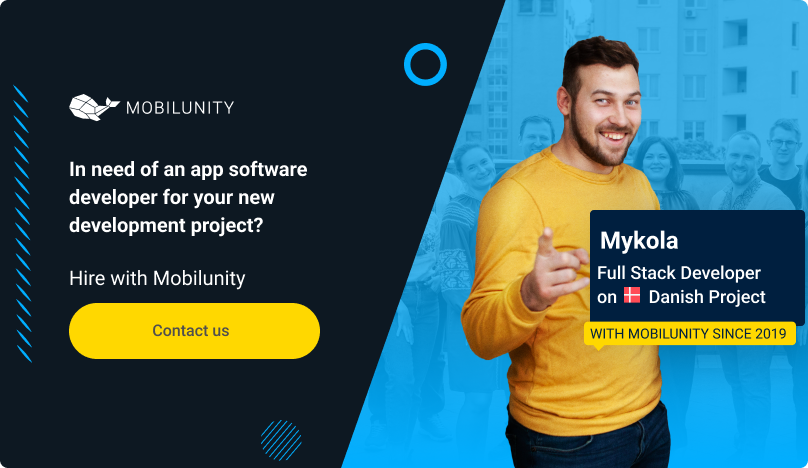
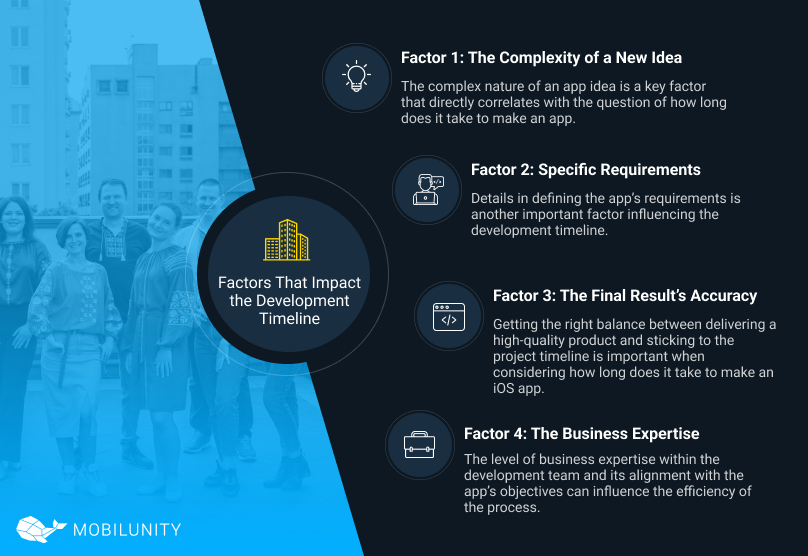
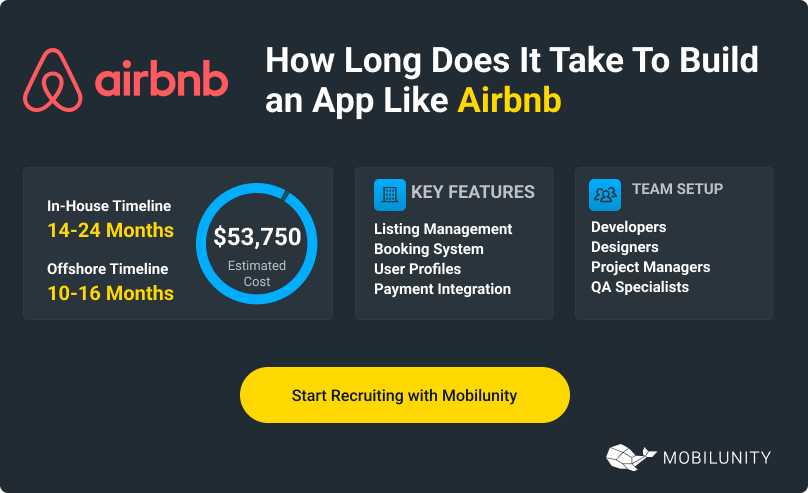
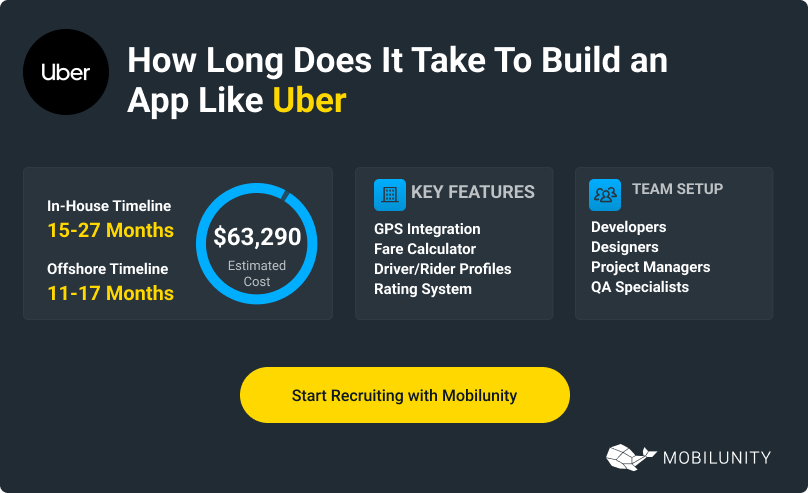
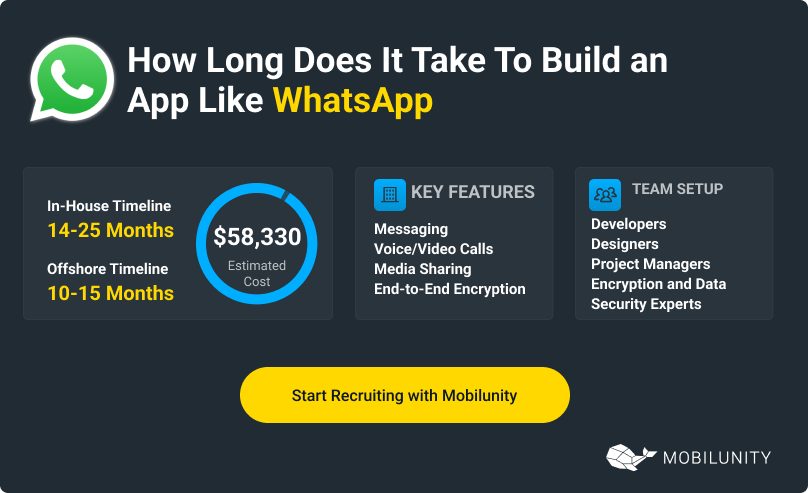
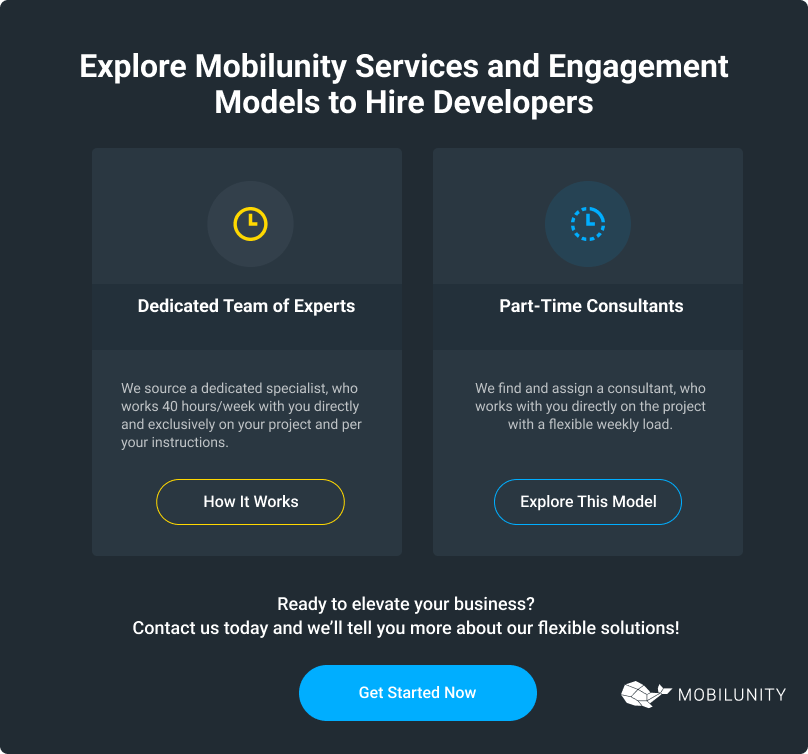

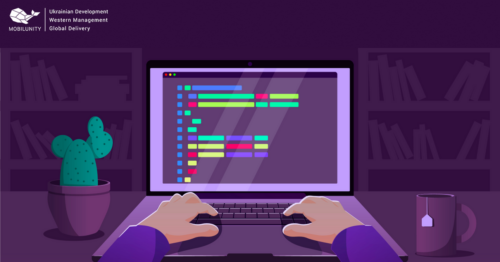
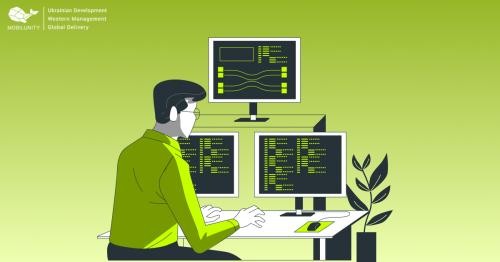
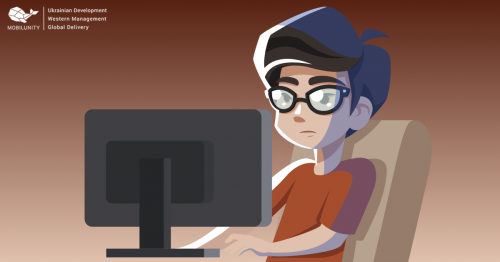
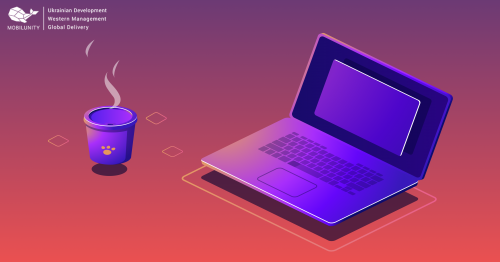
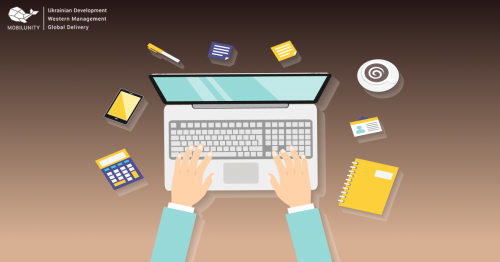
Recruiter’s Comment
“Mobile app development is much like assembling a puzzle; each piece, or team member, is vital. The right blend of technical expertise, creativity, and strategic vision is essential. It’s not just about coding skills; it’s about finding people who can breathe life into a concept, transforming a simple idea into an indispensable tool in the palm of your hand.” – Zoryna Yushko, Top Recruiter and Industry Expert.